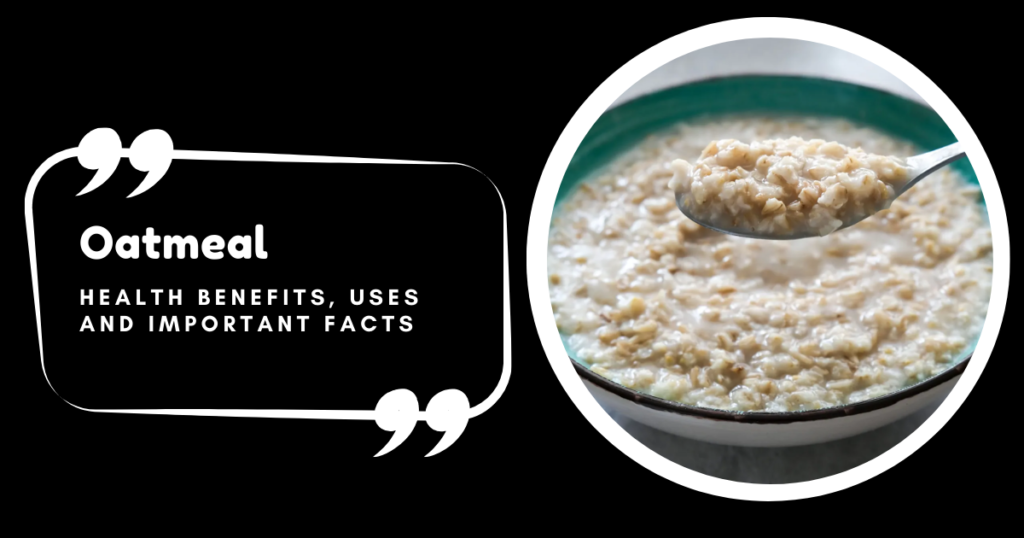Oatmeal, a beloved breakfast staple enjoyed by millions worldwide, is much more than just a comforting morning meal. Bursting with nutritional goodness, oatmeal offers a multitude of health benefits, versatile culinary uses, and intriguing facts that make it a star in the realm of whole grains. Let’s delve deeper into the wonders of oatmeal, uncovering its secrets for a healthier and more satisfying lifestyle.
In the bustling world of breakfast choices, oatmeal stands as a stalwart champion of health and wholesomeness. Loved by many for its comforting warmth and nourishing properties, oatmeal holds a special place in the hearts and bowls of people across the globe. But what exactly is oatmeal, and where does it come from? Join me on a journey through the history, origins, and benefits of this beloved breakfast staple, as we uncover the story behind this humble yet mighty grain.
Origins and History
Oatmeal traces its origins back thousands of years to the fertile lands of Western Asia and Europe. The oat plant, scientifically known as Avena sativa, is a hardy cereal grain that thrives in cool, moist climates. Ancient civilizations, including the Greeks, Romans, and Egyptians, cultivated oats for both food and medicinal purposes. However, it wasn’t until around 1000 BC that oats gained widespread popularity as a staple food in Northern Europe and the British Isles.
Evolution of Oatmeal
The journey from raw oats to the creamy, comforting dish we know as oatmeal is a testament to human ingenuity and culinary innovation. Early civilizations consumed oats in various forms, including porridges, bread, and gruels. However, it was the Scottish who perfected the art of oatmeal, elevating it to a cultural icon known as “porridge.”
In Scotland, oatmeal became a dietary mainstay, providing sustenance to farmers, laborers, and warriors alike. Traditional Scottish oatmeal, made from steel-cut oats, was cooked slowly over an open flame to create a thick, hearty porridge known as “porridge.” This simple yet nourishing dish sustained generations of Scots through harsh winters and long days in the fields.
Benefits of Oatmeal
1. Heart Health:
Oatmeal is renowned for its heart-healthy properties, thanks to its high content of soluble fiber, particularly beta-glucan. Soluble fiber helps lower cholesterol levels by binding to cholesterol in the digestive tract and facilitating its excretion. By reducing LDL cholesterol levels, oatmeal helps protect against heart disease and stroke, making it a cornerstone of a heart-healthy diet.
2. Digestive Health:
The fiber in oatmeal promotes healthy digestion by adding bulk to the stool and preventing constipation. Additionally, oatmeal contains resistant starch, a type of fiber that acts as a prebiotic, feeding beneficial gut bacteria and supporting digestive health. Regular consumption of oatmeal can help maintain regular bowel movements and promote a healthy gut microbiome.
3. Blood Sugar Control:
Oatmeal has a low glycemic index, meaning it doesn’t cause rapid spikes in blood sugar levels after consumption. The soluble fiber in oatmeal slows down the absorption of glucose into the bloodstream, helping stabilize blood sugar levels and reducing the risk of insulin resistance and type 2 diabetes. For individuals with diabetes, oatmeal can be an excellent choice for managing blood sugar levels and promoting overall health.
4. Weight Management:
Oatmeal’s high fiber content and satiating properties make it an excellent choice for weight management. The fiber in oatmeal helps you feel full and satisfied for longer periods, reducing overall calorie intake and supporting weight loss efforts. By promoting feelings of fullness and preventing overeating, oatmeal can help individuals achieve and maintain a healthy weight.
5. Nutrient Density:
Oatmeal is a nutritional powerhouse, packed with essential nutrients, including B vitamins, iron, magnesium, phosphorus, and zinc. These nutrients play vital roles in energy metabolism, immune function, and overall health and well-being. By incorporating oatmeal into your diet, you can boost your nutrient intake and support optimal health and vitality.
How to Enjoy Oatmeal
Oatmeal’s versatility extends beyond the breakfast table, offering countless possibilities for culinary creativity. Whether you prefer it sweet or savory, hot or cold, oatmeal can be customized to suit your taste preferences and dietary needs. Here are some delicious ways to enjoy oatmeal:
- Classic Oatmeal: Cook oats with water or milk on the stovetop or in the microwave until creamy and tender. Add your favorite toppings, such as fresh fruit, nuts, seeds, honey, or cinnamon, for added flavor and nutrition.
- Overnight Oats: Combine oats with yogurt or milk and refrigerate overnight for a quick and easy breakfast option. In the morning, top with your favorite fruits, nuts, or nut butter for a satisfying meal on the go.
- Oatmeal Smoothies: Blend cooked oats with your favorite fruits, greens, and protein powder for a nutritious and filling smoothie. Oats add thickness and texture to smoothies while providing a boost of fiber and nutrients.
- Baked Oatmeal: Mix oats with eggs, milk, sweetener, and flavorings to create a hearty baked oatmeal dish. Customize with your favorite add-ins, such as berries, nuts, chocolate chips, or shredded coconut, for a delicious and satisfying breakfast or brunch option.
Understanding Oatmeal
Definition and Composition:
Oatmeal is a type of porridge made from ground oats, commonly referred to as oat groats, rolled oats, or steel-cut oats. Oats are a whole grain rich in fiber, vitamins, minerals, and antioxidants, making oatmeal a nutritious choice for breakfast or any time of day.
Types of Oatmeal:
There are several types of oatmeal available, each with its own texture and cooking time:
- Steel-Cut Oats: These are oat groats that have been chopped into smaller pieces with steel blades. Steel-cut oats have a chewy texture and take longer to cook than other types of oatmeal.
- Rolled Oats: Also known as old-fashioned oats, rolled oats are oat groats that have been steamed and flattened with large rollers. They cook more quickly than steel-cut oats and have a softer texture.
- Instant Oats: These are thinly rolled oats that have been precooked and dried for faster cooking. Instant oats are convenient but may have a softer texture and lower nutritional value than steel-cut or rolled oats.
Health Benefits of Oatmeal
1. Heart Health:
Oatmeal is renowned for its heart-healthy properties, thanks to its high soluble fiber content, particularly beta-glucan. Soluble fiber helps lower cholesterol levels by binding to cholesterol in the digestive tract and promoting its excretion, reducing the risk of heart disease and stroke.
2. Digestive Health:
The fiber in oatmeal promotes healthy digestion by adding bulk to the stool and preventing constipation. Additionally, oatmeal contains resistant starch, a type of fiber that feeds beneficial gut bacteria and supports digestive health.
3. Blood Sugar Control:
Oatmeal has a low glycemic index, meaning it doesn’t cause spikes in blood sugar levels after consumption. The soluble fiber in oatmeal slows down the absorption of glucose into the bloodstream, helping stabilize blood sugar levels and reducing the risk of insulin resistance and type 2 diabetes.
4. Weight Management:
Oatmeal’s high fiber content and satiating properties make it an excellent choice for weight management. Eating oatmeal can help you feel full and satisfied for longer periods, reducing overall calorie intake and supporting weight loss efforts.
5. Nutrient Density:
Oatmeal is rich in essential nutrients, including B vitamins, iron, magnesium, phosphorus, and zinc. These nutrients play vital roles in energy metabolism, immune function, and overall health and well-being.
6. Antioxidant Activity:
Oatmeal contains antioxidants like avenanthramides, which help reduce inflammation and protect cells from damage caused by free radicals. These antioxidants may lower the risk of chronic diseases and promote longevity.
Uses of Oatmeal
Culinary Applications:
Oatmeal can be prepared in a variety of ways to suit different tastes and preferences. It can be cooked on the stovetop with water or milk to make a creamy porridge, or it can be soaked overnight with yogurt or milk for overnight oats. Oatmeal can also be incorporated into baked goods like cookies, muffins, and bread for added nutrition and texture.
Dietary Supplements:
Oatmeal is available in supplement form, including oat bran and oat fiber capsules or powders. These supplements provide a convenient way to increase fiber intake and support digestive health, especially for individuals who may not consume enough fiber through their diet.
Skincare:
Oatmeal has soothing and anti-inflammatory properties that make it beneficial for skincare. Oatmeal baths can help relieve itching, irritation, and inflammation associated with conditions like eczema, psoriasis, and sunburn.
Pros and Cons of Oatmeal
Oatmeal boasts numerous health benefits, including promoting heart health, aiding in weight management, and supporting digestive health due to its high fiber content. Its soluble fiber, particularly beta-glucan, helps lower cholesterol levels and stabilize blood sugar levels. However, individuals with gluten sensitivities or allergies should be cautious, as oats may be processed in facilities that handle gluten-containing grains, leading to potential cross-contamination. Overall, oatmeal is a nutritious choice that can be enjoyed as part of a balanced diet, provided it’s chosen carefully to meet individual dietary needs and preferences.
Important Facts
1. Gluten Content:
While oats are naturally gluten-free, they may be processed in facilities that also handle gluten-containing grains like wheat, barley, and rye. As a result, cross-contamination can occur, making some oatmeal products unsafe for individuals with celiac disease or gluten sensitivities. Look for certified gluten-free oats if you need to avoid gluten.
2. Allergen Considerations:
Oatmeal is generally well-tolerated by most people and is not a common allergen. However, some individuals may be allergic to oats and should avoid oatmeal if they experience symptoms like hives, itching, or difficulty breathing after consumption.
3. Instant Oatmeal:
While convenient, instant oatmeal packets often contain added sugar, salt, and artificial flavors, which can detract from their nutritional value. Opt for plain or unsweetened varieties and customize your oatmeal with healthy toppings like fresh fruit, nuts, seeds, and cinnamon for added flavor and nutrition.
4. Organic Options:
Choosing organic oatmeal can minimize exposure to pesticides and herbicides commonly used in conventional oat farming. Look for certified organic oatmeal to ensure it meets organic standards and has been grown and processed without synthetic chemicals.
In Conclusion:
Oatmeal is a nutritional powerhouse that offers a host of health benefits and culinary possibilities. From supporting heart health and digestion to providing essential nutrients and antioxidants, oatmeal stands out as a versatile and nourishing food choice. Whether enjoyed as a comforting breakfast porridge, a wholesome ingredient in baked goods, or a soothing skincare remedy, oatmeal has earned its rightful place as a beloved and beneficial addition to a healthy lifestyle. Embrace the goodness of oatmeal and savor its many delights for a happier, healthier you.



